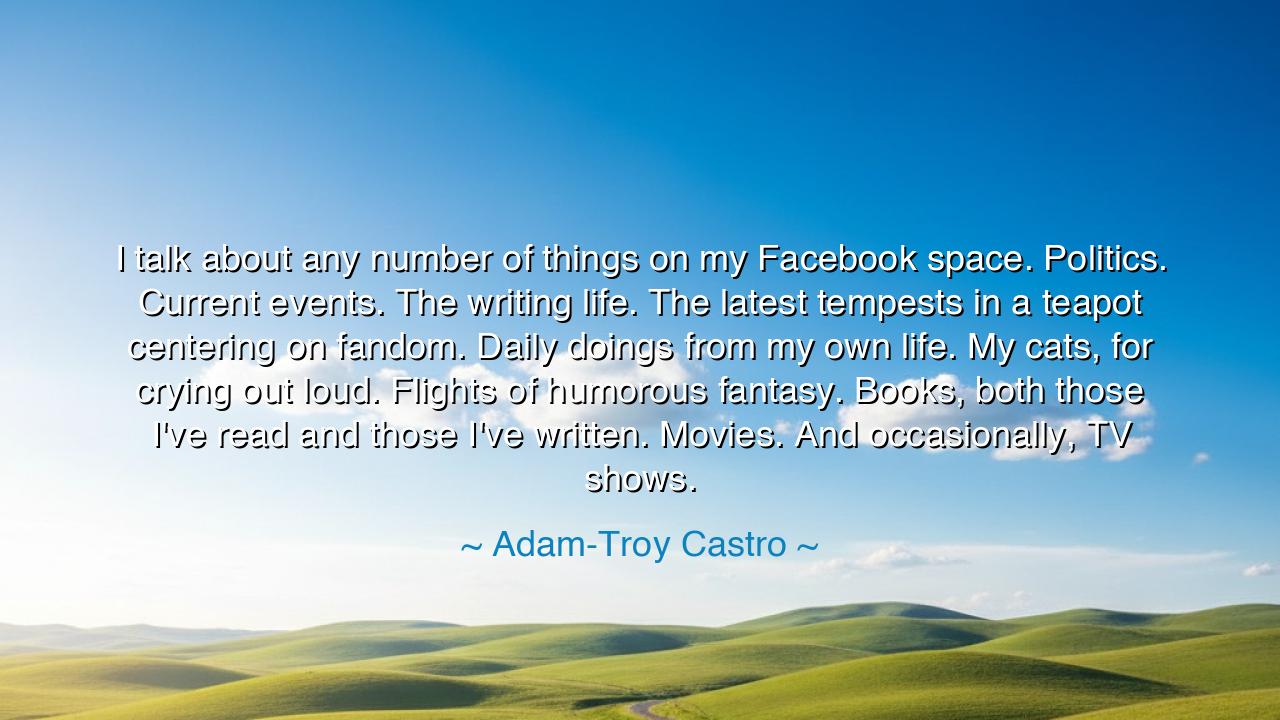
I talk about any number of things on my Facebook space. Politics.
I talk about any number of things on my Facebook space. Politics. Current events. The writing life. The latest tempests in a teapot centering on fandom. Daily doings from my own life. My cats, for crying out loud. Flights of humorous fantasy. Books, both those I've read and those I've written. Movies. And occasionally, TV shows.






Adam-Troy Castro, writer of strange wonders and fierce imagination, declared with candor: “I talk about any number of things on my Facebook space. Politics. Current events. The writing life. The latest tempests in a teapot centering on fandom. Daily doings from my own life. My cats, for crying out loud. Flights of humorous fantasy. Books, both those I've read and those I've written. Movies. And occasionally, TV shows.” At first, these words appear as nothing more than a list, a casual chronicle of a man’s online musings. Yet beneath their plainness lies a deeper meaning: that the modern storyteller no longer speaks only from the lofty tower of print, but from the living fabric of daily life, sharing with his audience the vast range of human experience—grand and trivial alike.
The origin of this saying lies in the digital age, when the ancient marketplace of ideas has taken new form in the social web. Once, writers were distant figures, their voices carried only through the parchment, the press, or the binding of a book. They revealed themselves in crafted tales but kept their private lives cloaked in silence. Yet now, as Castro confesses, the line between art and living has blurred. A Facebook space becomes a public square where the writer is not only the teller of crafted stories but also the sharer of his breakfast, his grief, his laughter, even the antics of his cats.
The meaning runs deeper still. By naming this diversity of topics—politics, books, fandom, movies, fantasy—Castro reveals the wholeness of the human spirit. For the storyteller is not built only of myth or craft, but of every passing detail of life. The smallest anecdote may feed the greatest tale; the daily doings of an ordinary morning may become the seed of extraordinary vision. By refusing to separate the mundane from the majestic, he proclaims that all things belong to the creative life.
History itself gives proof of this truth. Consider Samuel Pepys, whose diary chronicled both the affairs of kings and the buying of fish at market. Centuries later, we value not only his account of great fires and wars, but also his chatter about dinner, love, and music. Or recall Marcus Aurelius, emperor of Rome, who wrote not for the crowd but for himself, noting reflections on politics, on duty, on life’s daily burdens. These words, born in the quiet of private moments, endure as the Meditations, a beacon for generations. Castro stands in their lineage, showing that a man’s greatness may be found as much in the small as in the vast.
But the quote also carries a hidden charge: that we, in this new age, must learn to see value in the ordinary. The flights of humorous fantasy, the trivial disputes of fandom, even the mention of TV shows—these may seem unworthy of legacy. Yet they too are the threads of culture, shaping how people dream, argue, and connect. To record them is to preserve the texture of an age. In this way, Castro’s list becomes not casual, but heroic in its humility: the acknowledgment that everything belongs to the tapestry of human life.
O children of tomorrow, learn from this: do not despise the small things. Share your joys, your struggles, your trivial amusements, for in them lies the truth of being alive. The books you read, the movies you watch, even the laughter drawn from your pets—all of these, when shared, can connect you to others across the distances of silence. The greatness of life is not built of monumental events alone, but of countless small gestures bound together.
Thus the lesson is clear: speak fully, live fully, record fully. Let your voice wander from the serious to the silly, from the eternal to the fleeting, and do not fear that such variety weakens your dignity. For it is precisely this abundance that makes you whole. As Adam-Troy Castro shows us, the storyteller’s duty is not only to shape imagined worlds but also to reveal the fullness of life itself, until even the smallest of things resound with meaning.
And so his words endure as a teaching: the space we inhabit—digital or physical—becomes a vessel of communion when we fill it with the breadth of our humanity. To share of ourselves, from politics to cats, is to weave a bridge between souls. And that, in the end, is the highest art of all.






AAdministratorAdministrator
Welcome, honored guests. Please leave a comment, we will respond soon